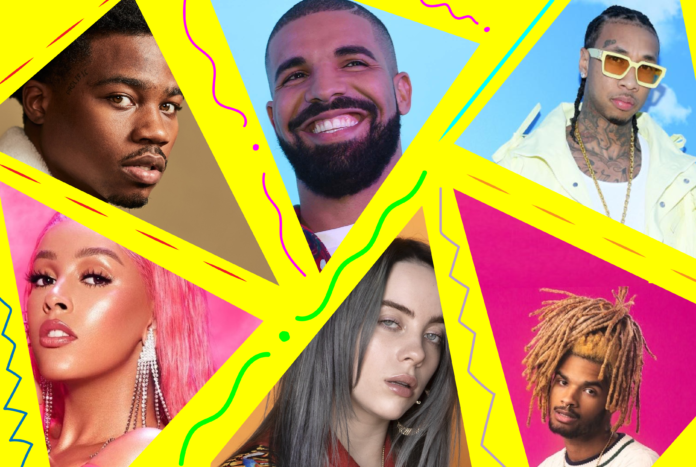I’m talking to you, Drake.
TikTok has become an unfortunate constant in my life.
In the time of coronavirus, I find that my lectures are punctuated by a scroll through the hilarious video-sharing app as a sort of cleanser.
TikTok is an important tool in music because its trends, like dances and lip syncs, are usually reliant on different song clips and remixes. The app’s influence is so widespread that successful TikTok songs become smash hits in a matter of weeks. It also helps that other social media platforms, such as Instagram, have become a mecca for TikTok videos.
What I initially admired about TikTok was its ability to popularize unknown artists. Doja Cat, for one, has finally received the critical acclaim she deserves. Her album “Hot Pink” is the breeding ground for multiple TikTok trends.
Lip syncing to Ant Saunders’ “Yellow Hearts” landed him a record deal with Arista Records, a label that has signed the likes of Patti Smith and Aretha Franklin. Audrey Mika went from making YouTube covers with a toy microphone to releasing “Y U Gotta B Like That,” which has garnered over 25 million streams as well as high-profile collaborations for the young artist.
Danceability plays a large role in the virality of these tracks, as many users choreograph routines to different catchy songs. These trendy songs also usually have a story, a message that the artist is trying to paint for listeners through their lyrics.
The rise of these songs, however, has shed light on a developing issue in the music industry.
Drake’s “Toosie Slide” is a perfect example of this problem. When “Toosie Slide” dropped, I wasn’t expecting much out of it beyond a new workout anthem. Lyrically, Drake had other plans for us. In a “Cupid Shuffle” fashion, Drake tells listeners to pick up our left foot, then slide. Is this real life?
I don’t understand why Drake needed to release this record. Besides the fact that the “dance” is a watered-down Cha-Cha Slide, it felt like “Toosie Slide” was something Drake released to entertain the masses while they have absolutely nothing else to do.
Drake doesn’t need any popularization. He found fame before I could do long division. “Toosie Slide” was a cash grab that capitalized off the stagnation of our society and the popularity of choreographed dancing. Drake even reposted a video featuring the children of Ugandan orphan organization Masaka Kids Africana doing an amazing iteration of the dance. Even though it’s adorable, it’s exactly what Drake wanted. Viral hits, viral dances, big money.
Justin Bieber sought the same sort of acclaim earlier this year with “Yummy,” employing the same dance company from the “Sorry” music video to bolster the dance “feel.” And it worked. Hundreds upon hundreds of videos showcasing TikTok, Instagram and Twitter users’ body rolling talents dominated these platforms for weeks.
Drake and Bieber aren’t even the worst of this whole charade. Curtis Roach, a previously low-profile rapper, made “Bored In The House,” a fun little TikTok rap about quarantine. Users were inspired to show off their quarantine digs and activities with the song as their background. In fact, my friend had to do this TikTok challenge as a sort of back-to-school project for his professor.
Everyone’s favorite rapper, Tyga, decided to piggyback off the viral fame of Curtis Roach, turning the charming table beat about quarantine into yet another creepy Tyga song.
Curtis Roach has to be very excited about this, and rightfully so. Tyga is a heavyweight hitmaker, and to have him be featured on your song spells future success. But at the end of the day, Tyga reeks of greedy intentions. It’s self-serving to slap your name and a few bars onto a song that could have just remained a fun trend.
The strategies of Drake, Bieber and the like are logical. If being successful means going viral on social media, then it makes sense to strive to make the catchiest songs possible. But this need for virality will eventually change the ebb and flow of the music world as we know it.
With everyone working to make the social media world happy, we’re seeing dance hit after lipsync hit crop-up on the charts with no regard for the message behind them.
This is what I like about Doja Cat. Doja Cat’s “Cyber Sex” has gone viral for a six-second clip, but it tells the story of relationships in the digital age, which is what makes it so interesting to listen to. She also had a pretty grassroots start, similar to Audrey Mika. Both bred by the Internet, it’s only right they should gain so much attention on these platforms.
We shouldn’t settle for music without intention. This is what “Toosie Slide” and “Bored In The House” lack. Sure, make a song for the kids stuck inside. They’ll eat it up. But don’t give us something that is just for the sake of trends and money. Music can be fun and catchy while still being meaningful. As an art form, it is cheapened when it’s made for the sole purpose of financial gain.
Written by: Isabella Chuecos — ifchuecos@ucdavis.edu
Disclaimer: The views and opinions expressed by individual columnists belong to the columnists alone and do not necessarily indicate the views and opinions held by The California Aggie








